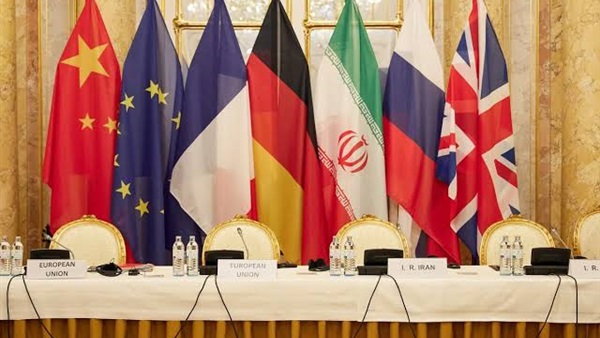Russia raises hopes for a return to the stalled Iran nuclear talks

Russian Foreign Minister Sergei Lavrov said Tuesday he has received “written guarantees” from the United States that Western sanctions on Russia related to Ukraine won’t affect Russia’s role in the Iran nuclear deal, potentially paving the way for a resumption of stalled talks to revive the agreement.
Lavrov was speaking alongside Iranian Foreign Minister Hossein Amirabdollahian, who was visiting Moscow. Negotiations in Vienna on reviving the 2015 deal were suspended Friday after a new Russian demand for guarantees on the sanctions threw the discussions into disarray.
The State Department insisted that “nothing additional” had been offered to Moscow beyond the terms of the original Iran nuclear agreement, called the Joint Comprehensive Plan of Action, or JCPOA. But “it has been logical to us, and should be logical to all parties, that we would not sanction Russia’s participation in nuclear projects that are part of a full return to the JCPOA,” State Department spokesperson Ned Price said.
“We can’t and we won’t and we have not provided assurances beyond that to Russia,” Price said. “Russia is not getting out of the sanctions and other financial measures that have been imposed for this war in Ukraine … These are separate realms, they are separate actions.”
Under the original deal, and as part of a new text that the Biden administration has said is largely identical, Iran was allowed to have no more than 300 kilograms of 3.67 percent enriched uranium. Russia agreed to take the excess existing at that time. Since the United States withdrew from the deal in 2018, reimposing sanctions that were lifted as part of it, Iran has far exceeded both the quantity and quality limits on enrichment, and Russia has again been expected to take the excess under the terms of a revived agreement.
The agreement also allowed for ongoing civil nuclear power cooperation between Russia and Iran, including Russia’s supply of fuel, maintenance and training for Iran’s only nuclear power plant at Bushehr, on its southern Persian Gulf coast. The plant, which went online in 2011, was built by Rosatom, Russia’s state atomic energy corporation.
Rosatom also agreed to build at least two new power reactors near Bushehr. Work began on them in 2017, and they are scheduled for completion in 2024 and 2026. Construction, along with ongoing fueling and maintenance of the new power plants — to be jointly owned by Russia and Iran — would provide a multibillion dollar financial windfall for Rosatom and for Russia.
Rosatom has sent technicians to Ukraine’s highly profitable Zaporizhzhia nuclear plant, the largest in Europe, which Russian forces seized nearly two weeks ago in their ongoing invasion of Ukraine. Russian forces also occupy the decommissioned Ukrainian nuclear plant at Chernobyl, where the Ukrainian government has said local staff is being held hostage, and power to cool remaining radioactive material has been repeatedly interrupted.
Neither the United States nor Russia had publicly specified the nature of Moscow’s last-minute demands, including whether they specifically related to the power plant construction and operation. Initially, Russia had seemed to be referring to a much wider range of trade and investment dealings with Iran that could be constrained under the new, Ukraine-related sanctions.
Asked to clarify the situation, a second State Department spokesman said that “The United States will take actions as necessary to ensure that U.S. sanctions do not apply to the implementation of such JCPOA nuclear-related projects and activities by non-U. S. individuals and entities.”
Lavrov said Tuesday that the guarantees Russia has sought were contained in the draft text of the agreement already negotiated by diplomats in Vienna. “All projects and areas of activity envisaged by the JCPOA have been protected, including the direct involvement of our companies and specialists.”
“We stand for the speedy resumption of the full implementation of the agreement,” he said.
Both Lavrov and his Iranian counterpart said it is now up to the United States to return to the negotiations. After talks broke down last week, Price said at the State Department that the fate of the deal depended on decisions made “in places like Tehran and Moscow.”
On Tuesday, Price said that “if it is appropriate” for U.S. negotiators to return to Vienna, “they are prepared to do so.”
Beyond the Ukraine sanctions issue, Price said, “there were and ar9e a small number of outstanding issues. Now that we are this close to the finish line, those outstanding issues tend to be the hardest issues, so we’re not there yet.”
Peter Stano, foreign policy spokesperson for the European Commission, which has coordinated the talks and called for last week’s pause in negotiations, said it would not preempt statements by the negotiating parties, but that “we expect the talks to resume and conclude very soon.”
In a positive sign, Iranian authorities returned the passport of a British woman detained in Iran for almost six years, according to a British parliamentarian. An exchange of prisoners between Iran and the West, to accompany the revival of the deal, is among the last remaining issues.
Aid worker Nazanin Zaghari-Ratcliffe spent almost five years in prison before being released recently to house arrest at her parents’ home, where she remains, said Tulip Siddiq, her member of parliament.
U.S. officials have said that separate negotiations over four U.S. citizens being held in Iran were not related to the nuclear talks, but that they could “not envision” signing a nuclear deal unless they were released.





